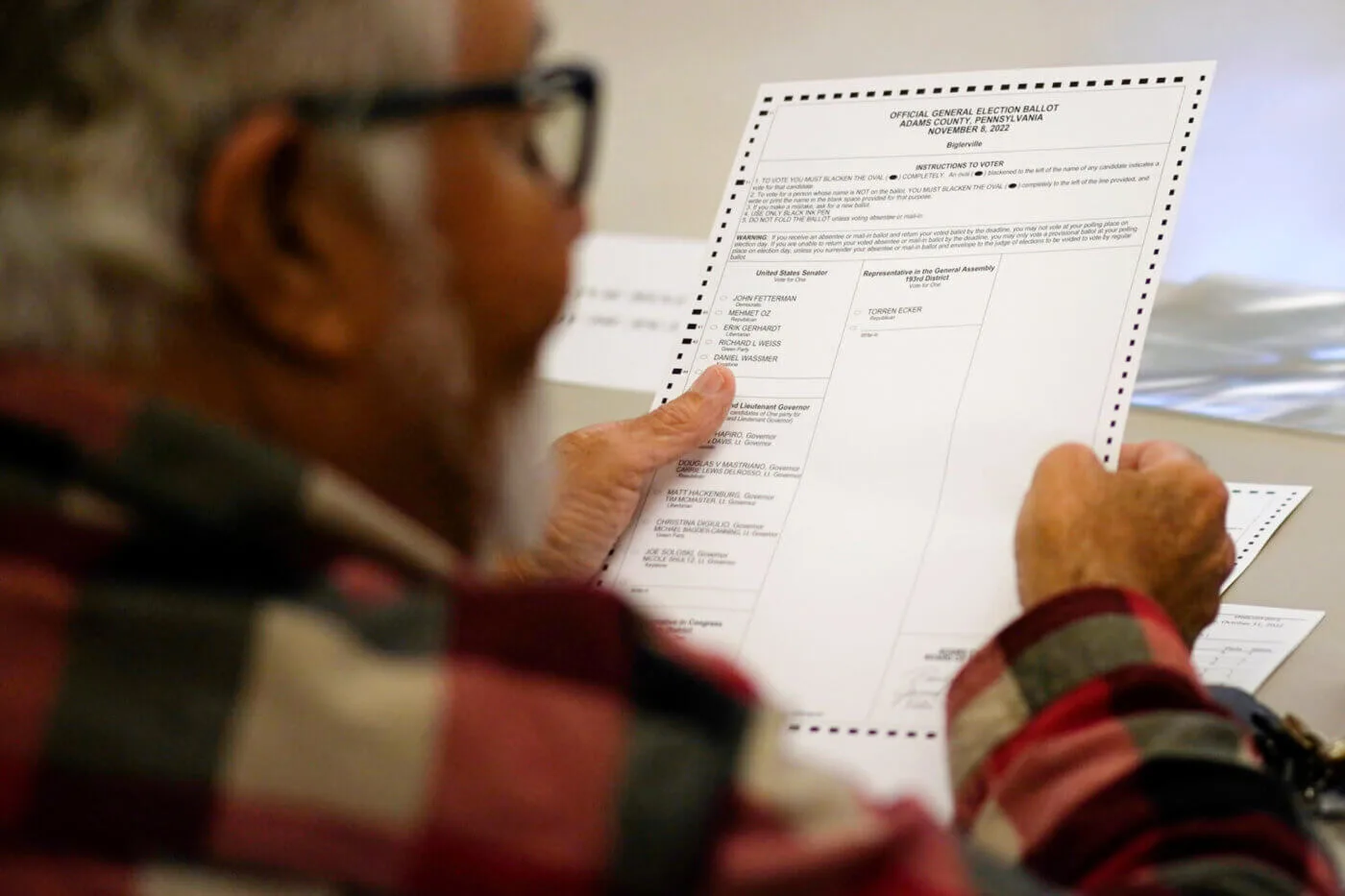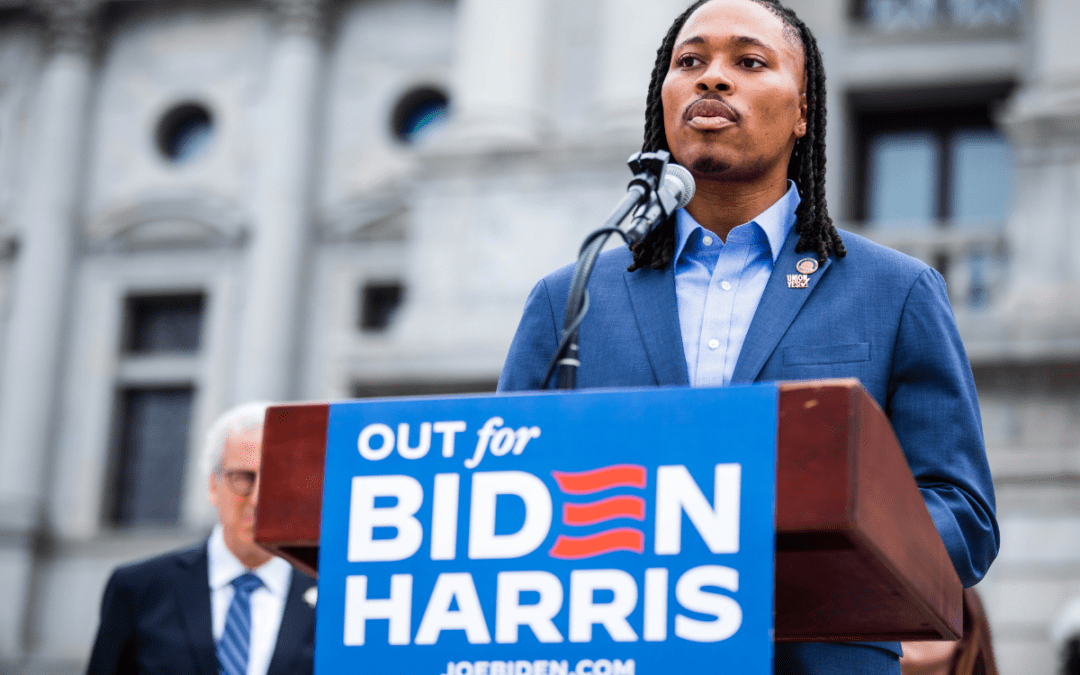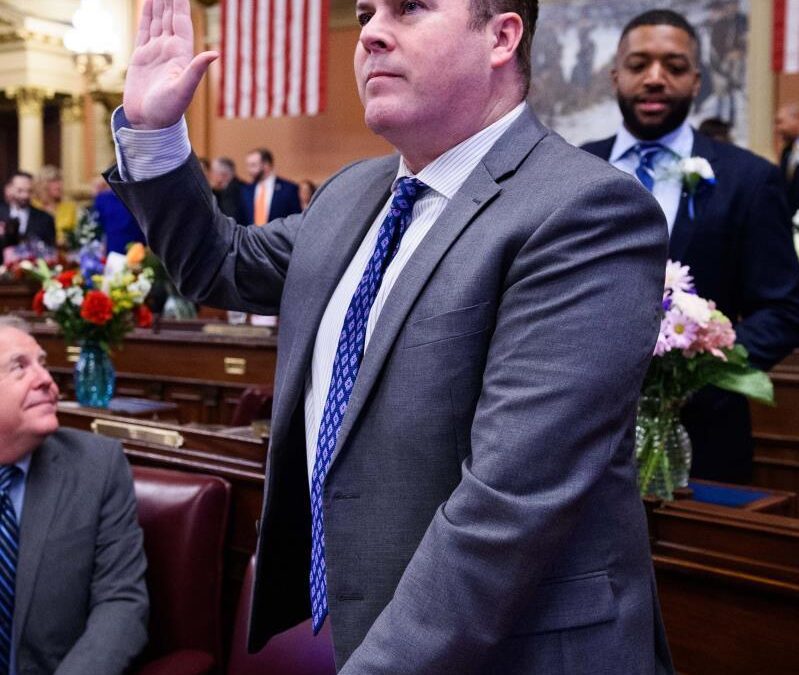
A poll worker holds a ballot at the Trinity Christian Fellowship Hall polling place in Biglerville, Pa., Tuesday, Nov. 8, 2022. (AP Photo/Carolyn Kaster)
Three proposed amendments to the state constitution are headed to the Senate for a vote after passing through the State Government Committee. If passed by both the Senate and House this month, they could go to voters as early as May.
Three proposed amendments to the Pennsylvania Constitution passed the Senate State Government Committee on Monday and could potentially make it on the ballot in the May primary.
The amendments include requiring voters to show ID at the poll for all elections, mandating the Office of Auditor General to routinely conduct audits following elections, and removing the governor’s veto power from the legislative process of overturning regulations.
All three passed by a vote of 8-3. Sen. Lisa Boscola (D-Lehigh) was the only lawmaker to split with her party and vote in favor of the measures.
The three bills will now go to the Republican-controlled Senate for a vote. If passed they would then go to the narrowly divided House for consideration.
Constitutional amendments must pass through both chambers in two consecutive legislative sessions before being put on the ballot for voters to decide. All three amendments were passed last year and, if passed again this month, would be on the ballot in the primary election on May 16.
Sen. Dan Laughlin (R-Erie) introduced SB 1 which would require voters to show identification every time they vote in the commonwealth. Currently, voters only need to show their ID when voting at a polling place for the first time.
Republican lawmakers say the amendment is needed to bolster faith in the state’s election system. Democrats have long opposed voter ID requirements, saying it could negatively impact minority and elderly voters who might lack proper identification.
SB 1 was amended to include the proposal to change the regulatory process to remove the governor’s veto power when lawmakers vote down a resolution. Currently, lawmakers can vote to disapprove a state regulation (such as those passed during the COVID-19 pandemic), but the governor has the power to veto it. The legislature would then need a two-thirds majority vote to override the veto.
Sen. Cris Dush (R-Jefferson), chair of the State Government Committee, proposed the amendment to the bill.
Touted as another effort to restore faith in the election system in Pennsylvania, Sen. Jarrett Coleman (R-Bucks) introduced SB 130 which would allow the state Auditor General to conduct regular election audits. The proposal would prohibit the Department of State, PennDOT, and counties from withholding information necessary to conduct a full and comprehensive audit. It also requires an annual, independent audit of the Statewide Uniform Registry of Electors (SURE) system. Currently, Pennsylvania counties carry out two types of post-election audits.
Last year, in an attempt to speed up the cumbersome amendment process, the Republican-majority state Senate lumped five different but significant changes to the constitution into one proposal. Senate Bill 106 contained the three amendments that just passed the State Government Committee in addition to an abortion ban and a proposal to make the lieutenant governor an appointed position.
Do you know who represents you in Harrisburg? Find out here.
Politics

Malcolm Kenyatta makes history after winning primary for Pa. Auditor General
State Rep. Malcolm Kenyatta, who was first elected to the state House in 2018, won the Democratic nomination for Pa. Auditor General and will...

Biden administration bans noncompete clauses for workers
The Federal Trade Commission (FTC) voted on Tuesday to ban noncompete agreements—those pesky clauses that employers often force their workers to...

Philadelphia DA cancels arrest warrant for state Rep. Kevin Boyle on eve of Pa. primary
Philadelphia District Attorney Larry Krasner said a detective had sought the warrant against Boyle, a Democrat whose district includes a section of...
Local News

What do you know about Wawa? 7 fun facts about Pennsylvania’s beloved convenience store
Wawa has 60 years of Pennsylvania roots, and today the commonwealth’s largest private company has more than 1,000 locations along the east coast....

Conjoined twins from Berks County die at age 62
Conjoined twins Lori and George Schappell, who pursued separate careers, interests and relationships during lives that defied medical expectations,...






